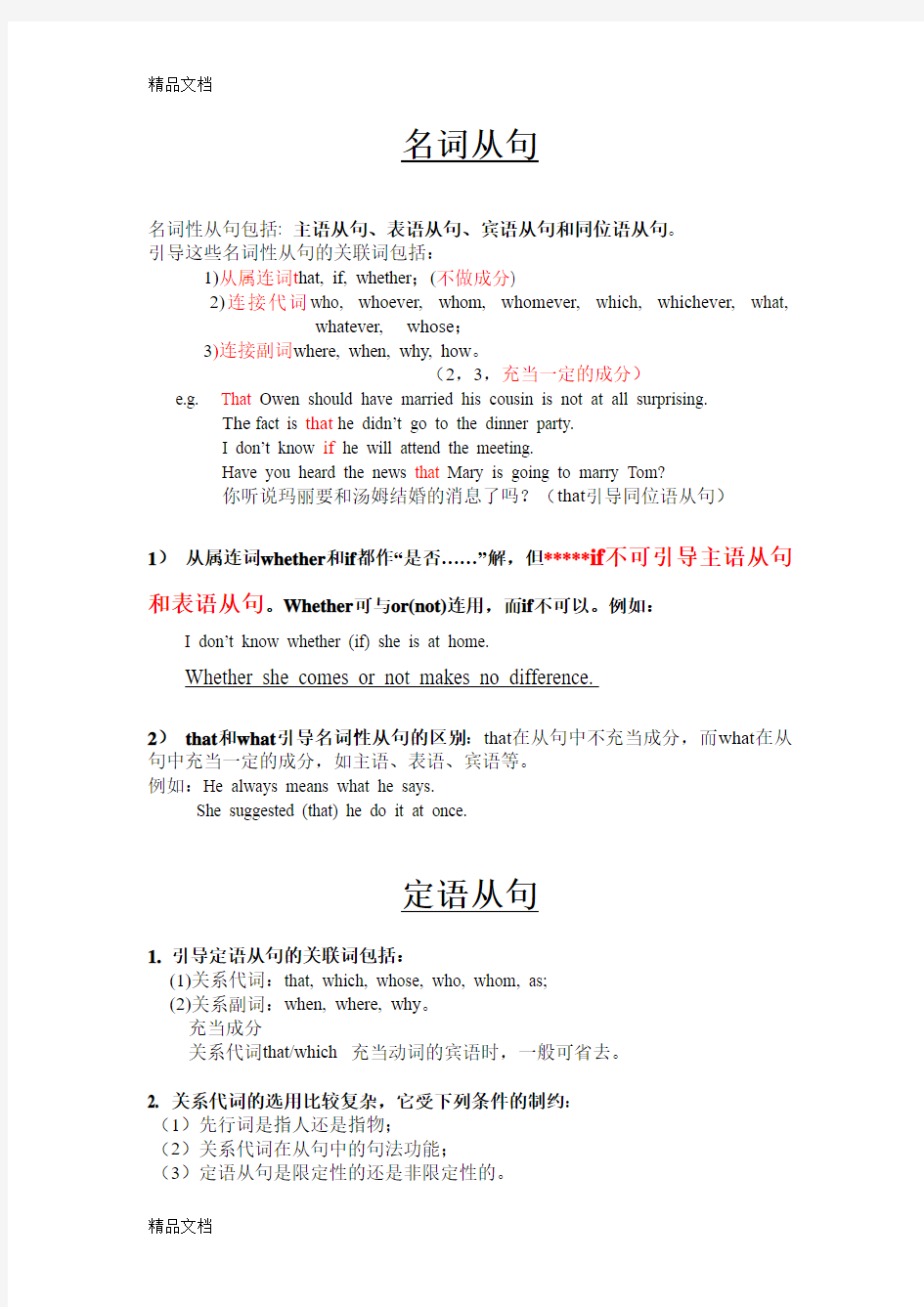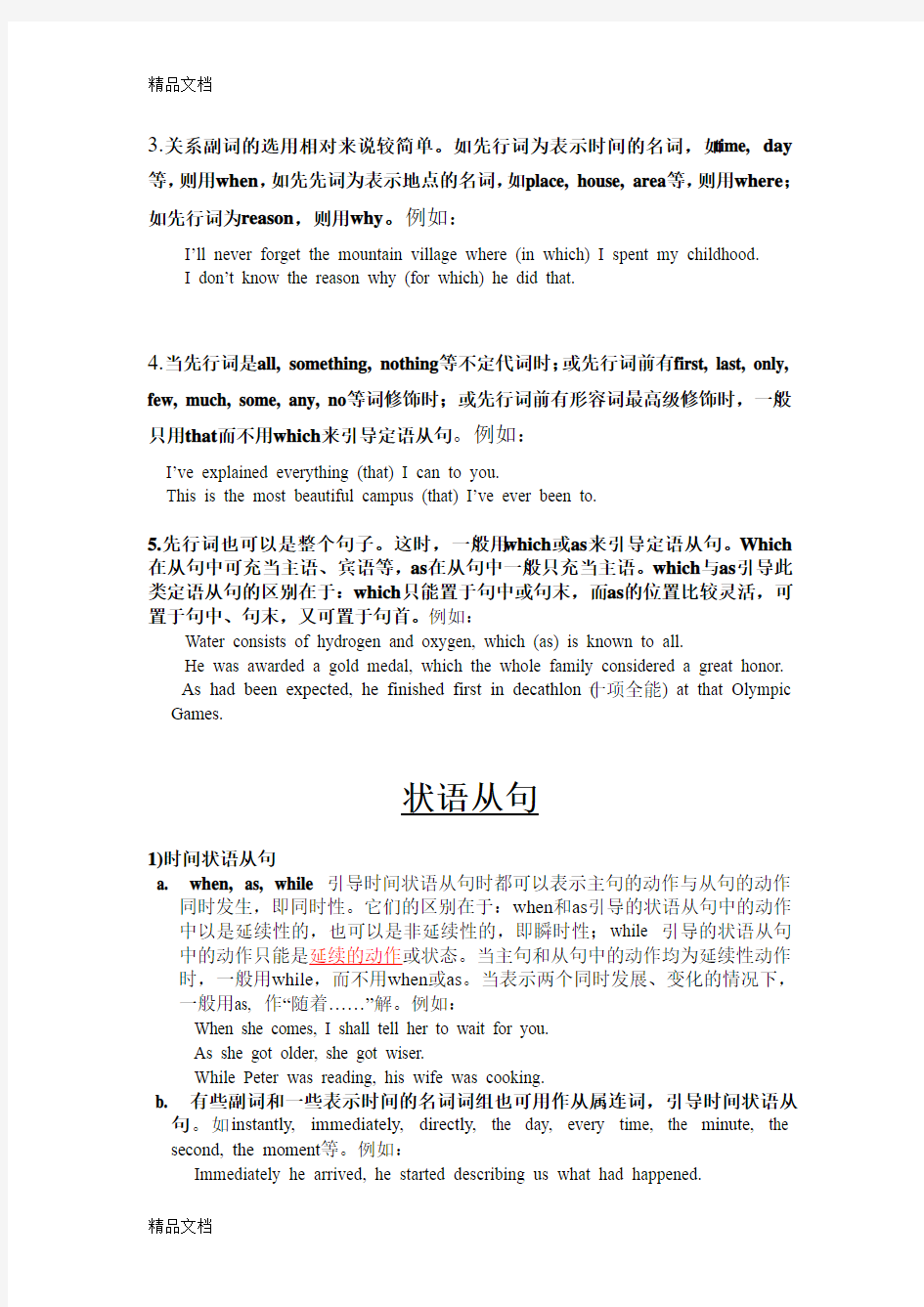最新大学英语语法之从句


名词从句
名词性从句包括: 主语从句、表语从句、宾语从句和同位语从句。
引导这些名词性从句的关联词包括:
1)从属连词t hat, if, whether;(不做成分)
2)连接代词who, whoever, whom, whomever, which, whichever, what,
whatever, whose;
3)连接副词where, when, why, how。
(2,3,充当一定的成分)
e.g. That Owen should have married his cousin is not at all surprising.
The fact is that he didn’t go to the dinner party.
I don’t know if he will attend the meeting.
Have you heard the news that Mary is going to marry Tom?
你听说玛丽要和汤姆结婚的消息了吗?(that引导同位语从句)
1)从属连词whether和if都作“是否……”解,但*****if不可引导主语从句和表语从句。Whether可与or(not)连用,而if不可以。例如:
I don’t know whether (if) she is at home.
Whether she comes or not makes no difference.
2)that和what引导名词性从句的区别:that在从句中不充当成分,而what在从句中充当一定的成分,如主语、表语、宾语等。
例如:He always means what he says.
She suggested (that) he do it at once.
定语从句
1.引导定语从句的关联词包括:
(1)关系代词:that, which, whose, who, whom, as;
(2)关系副词:when, where, why。
充当成分
关系代词that/which 充当动词的宾语时,一般可省去。
2. 关系代词的选用比较复杂,它受下列条件的制约:
(1)先行词是指人还是指物;
(2)关系代词在从句中的句法功能;
(3)定语从句是限定性的还是非限定性的。
3.关系副词的选用相对来说较简单。如先行词为表示时间的名词,如time, day 等,则用when,如先先词为表示地点的名词,如place, house, area等,则用where;如先行词为reason,则用why。例如:
I’ll never forget the mountain village where (in which) I spent my childhood.
I don’t know the reason why (for which) he did that.
4.当先行词是all, something, nothing等不定代词时;或先行词前有first, last, only, few, much, some, any, no等词修饰时;或先行词前有形容词最高级修饰时,一般只用that而不用which来引导定语从句。例如:
I’ve explained everything (that) I can to you.
This is the most beautiful campus (that) I’ve ever been to.
5.先行词也可以是整个句子。这时,一般用which或as来引导定语从句。Which 在从句中可充当主语、宾语等,as在从句中一般只充当主语。which与as引导此类定语从句的区别在于:which只能置于句中或句末,而as的位置比较灵活,可置于句中、句末,又可置于句首。例如:
Water consists of hydrogen and oxygen, which (as) is known to all.
He was awarded a gold medal, which the whole family considered a great honor.
As had been expected, he finished first in decathlon (十项全能) at that Olympic Games.
状语从句
1)时间状语从句
a. when, as, while 引导时间状语从句时都可以表示主句的动作与从句的动作
同时发生,即同时性。它们的区别在于:when和as引导的状语从句中的动作中以是延续性的,也可以是非延续性的,即瞬时性;while 引导的状语从句中的动作只能是延续的动作或状态。当主句和从句中的动作均为延续性动作时,一般用while,而不用when或as。当表示两个同时发展、变化的情况下,一般用as, 作“随着……”解。例如:
When she comes, I shall tell her to wait for you.
As she got older, she got wiser.
While Peter was reading, his wife was cooking.
b. 有些副词和一些表示时间的名词词组也可用作从属连词,引导时间状语从
句。如instantly, immediately, directly, the day, every time, the minute, the second, the moment等。例如:
Immediately he arrived, he started describing us what had happened.
The day he returned home, his grandpa was already dead.
2) 条件状语从句
引导条件状语从句的从属连词有:if, unless, , only if (只要)。例如:
If you don’t come on time, we’ll start out without you.
As (so) long as you keep on trying, you’ll certainly succeed.
除了以上提到的从属连词外,还有其它的一些词或词组也可引导条件状语从句。例如:providing that, provided, supposing that, suppose that, on condition that, in case等。例如:
Provided (that) he wins the support of the minority groups, he will be able to win the election. 如果他赢得了多数团体的支持,他就能够取得胜利。
3)原因状语从句
引导原因状语从句的从属连词有:because, since, as, now(that), in that, considering that等。例如:
Since the speaker can’t come, we’ll have to cancel the meeting.
in that和now (that) 的用法:in that引导的从句对主句进行解释的说明,意思是:在……方面,在于……;因为。Now (that) 表示既然。例如:Theory is valuable in that it can provide a direction for practice.
Now (that) the weather has improv ed, let’s go out for a picnic.
4) 让步状语从句
引导让步状语从句的从属连词有:though, although, even if (even though), as, no matter…despite the fact that, in spite of the fact that, while。例如:
Tom always enjoys swimming, even though the weather is rough.
一些疑问词在词尾加上ever后,也可引导让步状语从句相当于no matter+疑问词。这些词包括:whatever, wherever, whenever, whoever, however。例如:Whatever he says, don’t believe him.
Whoever you are, you must obey the traffic regulations.
5)目的状语从句
引导目的状语从句的从属连词有:
so that, so as to do…
in order that , in order to do
lest, in case, for fear that
So… that
例如:
?They climbed to the top of the building in order that they could get a bird’s-eye view of the city.
?Ask her to hurry up with these letters so that I can sign them.
?Take an umbrella in case it rains.
so that和in order that的区别:so that更常用,in order that更正式。so that 引
